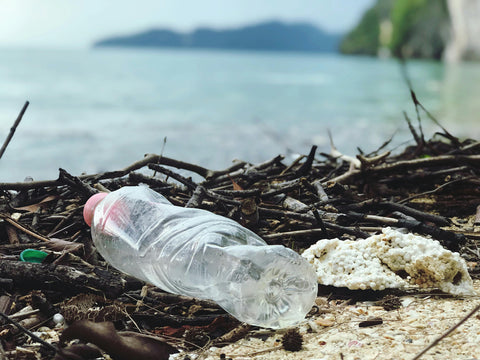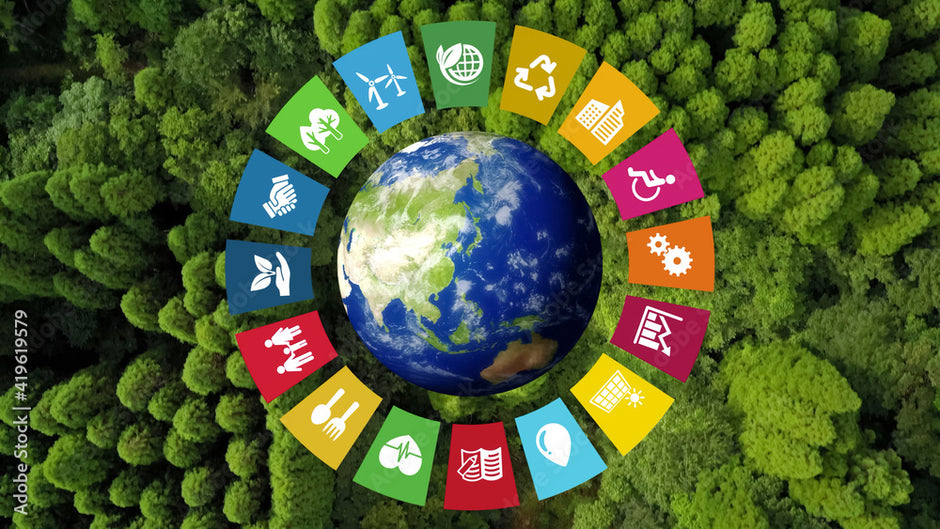Bamboi is plastic-free toilet paper. Plastic-free toilet paper is an important step in reducing the amount of plastic waste.
Plastic-free living is a lifestyle where the use of plastic in daily life is reduced or eliminated. There are various ways to maintain a plastic-free life, or at least consume less plastic. For example, by buying plastic-free products and plastic-free packaging. This can include everything from using reusable bags and containers to avoiding single-use plastics, such as straws and disposable cutlery.
The main reason to choose a plastic-free lifestyle is to reduce the amount of plastic pollution in the environment. Plastic is not biodegradable, which means it doesn't break down easily in the environment. Instead, it can take hundreds of years to decompose, and even then it doesn't completely disappear, but breaks down into increasingly smaller pieces, which can be harmful to wildlife and marine life. Plastic pollution is a global problem affecting the entire planet, and it's crucial that we take action to reduce the amount of plastic we use.

Plastic-free shopping
Plastic-free shopping is a growing trend among consumers looking for ways to reduce their environmental impact. Plastic waste is a serious problem: every year, millions of tons of plastic end up in our oceans and landfills. By choosing to shop without plastic, people can make a significant difference in reducing the amount of plastic waste that enters our environment.
One of the easiest ways to reduce plastic use while shopping is to bring your own reusable containers, boxes, and shopping bags to the supermarket. These can be used for fruits, vegetables, and bulk goods such as grains, nuts, and herbs. Many stores now offer bulk sections where you can buy these items without packaging. The Dutch supermarket chain Ekoplaza was the first supermarket chain to offer a plastic-free aisle to its customers in 2018.
Another way to reduce plastic use is to buy products that aren't pre-packaged. For example, choose fruits and vegetables that are sold loose and carry them in a cloth or paper bag instead of a plastic bag. Some stores even offer the option to weigh and label your products in the store, so you can avoid plastic bags altogether.
If you want to buy pre-packaged products, look for items packaged in paper, glass, or metal. These materials are easier to recycle than plastic and are less harmful to the environment. Avoid products packaged in multiple layers of plastic, such as individually wrapped snacks, and opt for larger packages instead.
Plastic-free packaging
Plastic-free packaging is a growing trend in the consumer goods industry as more people become aware of the environmental effects of plastic waste. Plastic pollution is a serious problem that affects not only the environment but also public health and the economy. Plastic packaging contributes significantly to this problem, as it's estimated that about 40% of all plastic produced is used for packaging.
The use of plastic packaging is so widespread because it's cheap, lightweight, and durable. However, these same properties that make plastic packaging convenient also make it a major contributor to pollution. It can take hundreds of years for plastic to break down, and during that time it can harm wildlife, marine life, and the environment. Plastic packaging also contributes to the problem of plastic waste, as much of it ends up in landfills or the ocean.

Plastic-free toilet paper
Meanwhile, many different types of plastic-free products are already available, including products for a plastic-free bathroom. One example is plastic-free toilet paper. Plastic-free toilet paper is an important step in reducing the amount of plastic waste that ends up in landfills and oceans.
Plastic-free toilet paper is a growing trend in the personal hygiene sector as more consumers become aware of the environmental effects of traditional toilet paper products. Conventional toilet paper is often wrapped in plastic packaging, which contributes to the global problem of plastic pollution. Moreover, many toilet paper brands are made from new trees, which can have a negative impact on the environment and wildlife habitats. This is in contrast to Bamboi toilet paper, which is made from the fast-growing grass species bamboo.
Plastic-free toilet paper is increasingly available and offers a sustainable alternative for consumers who want to reduce their ecological footprint. These products are packaged in materials such as paper or biodegradable cellulose, and are often made from recycled paper or bamboo. Bamboo is a fast-growing, renewable resource that is easy to cultivate and requires less water and pesticides than traditional tree farming.
Besides being environmentally friendly, plastic-free toilet paper is also better for health. Many traditional toilet paper brands contain harsh chemicals and bleaches, which can irritate the skin and cause allergic reactions. Plastic-free toilet paper is often made with natural ingredients and is free from harsh chemicals.
In short, plastic-free toilet paper is an excellent option for consumers who want to reduce their ecological footprint and improve their personal health. A good plastic-free alternative is bamboo toilet paper from Bamboi. By switching to plastic-free Bamboi toilet paper, you can do your part in protecting the planet and have a positive impact on the environment. Shop our paper here!





































